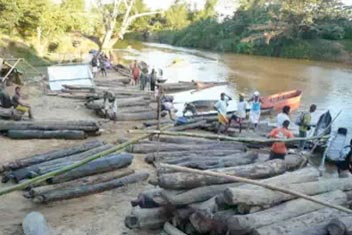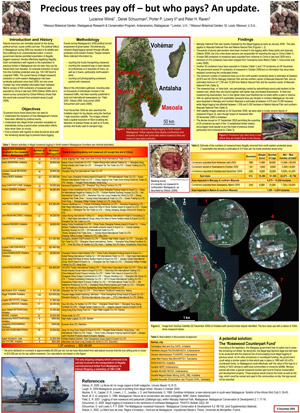Facing cash crunch, will Madagascar's politicians sanction rainforest plunder?
Madagascar's interim government may sell out its forests.
Commentary, wildmadagascar.org | January 07, 2010
Facing a severe cash crunch in the aftermath of a March military coup which triggered donor governments to suspend aid and crippled its economy, Madagascar's top politicians are reportedly mulling the export of tens of millions of dollars' worth of precious hardwoods illegally logged from the country's rainforest parks, according to high-placed sources in the Indian Ocean island nation.
Just two weeks after a $40 million dollar shipment of rosewood was canceled following international outcry, sources report that representatives from Madagascar's interim president Andry Rajoelina's government may be pressuring Delmas, a French shipping company that would have handled the December 22nd shipment, to begin picking up tens of millions of dollars worth of rosewood stored in containers in the port of Vohemar. Christian Claude Bezokiny, the owner of the Hôtel Palissandre in Antananarivo and also a rosewood trader, said Wednesday that Rajoelina has cleared him to export 115 containers. Bezokiny has already exported more than $10 million worth of rosewood over the past year, despite restrictions on logging. Jeannot Ranjanoro, who may be Madagascar's largest rosewood trafficker according to a report released last year, is apparently also preparing shipments. Ranjanoro is said to export rosewood under Flavour Handling LLC, a corporation based in Delaware. As a U.S. company, if Flavour Handling is shown to be involved in timber trafficking that violates Madagascar's environmental laws, it could be potentially exposed to prosecution under the Lacey Act. Flavour Handling did not immediately respond to a request for comment.
Rosewood logs.
Precious hardwood logs are tied together with lianas and floated down rivers on rafts made from lighter species as trees. 5-6 lighter logs are needed to float each rosewood log, exacerbating the impact of rosewood extraction.
Until the cancellation of the December 22nd shipment, Delmas had been the most prominent shipping company involved in rosewood trafficking, which surged amid Madagascar's political crisis. A representative from the company said last week that it was no longer transporting rosewood, but there are indications its position may change.
"Delmas appears to be under pressure in Madagascar," said a source who spoke on the condition of anonymity. "Someone is threatening them that if they do not export the rosewood then they can forget about exporting anything else from Madagascar."
"Delmas is the only shipping company able to load up the required number of containers in Vohemar port - the other companies don't have enough empty containers there."
Resumption of the rosewood trade could be a windfall for traders — rosewood is one of the few sources of foreign exchange at the moment in Madagascar, where banks — especially in the north — are reported to be having difficulty facilitating large cash transactions. With elections the approaching, rosewood may also be seen by politicians as a means to fund campaigns, according to another observer.
Overview of the logging crisis. Click image to enlarge.
This poster was prepared by researchers at the Missouri Botanical Gardens and other groups. The Missouri Botanical Gardens has played a key role in documenting and working to end the destruction of Madagascar's rainforests.
But while traders and politicians may benefit from lifting of the export ban on rosewood, its unclear whether most Malagasy (as the people of Madagascar are known) would see the upside. Logging has taken a heavy toll in some of Madagascar's most spectacular parks, which are the basis for the 390-million-a-year tourism industry. Further, logging has been associated with a rise in commercial bushmeat hunting of birds and endangered lemurs, chief draws for tourists. Therefore expanded logging could well have long-term ecological impacts on the country's most biodiverse forest thereby undermining ecotourism for years to come.
So what can be done? One observer is calling for an embargo on rosewood and pressure on the Rajoelina regime and French government, which has ostensibly supported an E.U. policy to crack down on illegal logging (FLEGT) and a U.N. initiative to reduce deforestation (REDD).
"We all know that Madagascar needs money, but we also know that the rosewood money won't benefit the poor, won't save lives and will only enrich the logging syndicate," the source said. "The embargo is certainly the best thing we can do. We also need to question the French government on its involvement in the affair since it provides political and financial support to Rajoelina's transitional authority."
Rajoelina is in a difficult position. He is viewed by most of the world as an illegitimate leader. Consequently most donor countries have suspended aid, which accounts for roughly 50 percent of the government's budget. So perhaps it is not surprising that his administration has turned to rosewood as a source of foreign exchange. Nevertheless exploiting rosewood isn't a long-term solution to Madagascar's ills. Madagascar needs good governance, something that at this point will only come through political compromise that leads to resumption in foreign aid until the country is back on its feet.












No comments:
Post a Comment